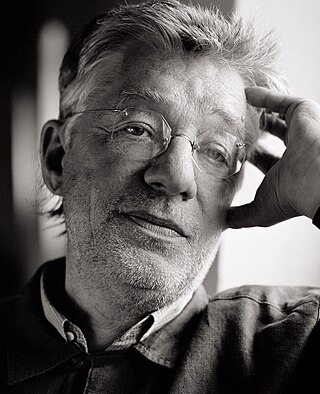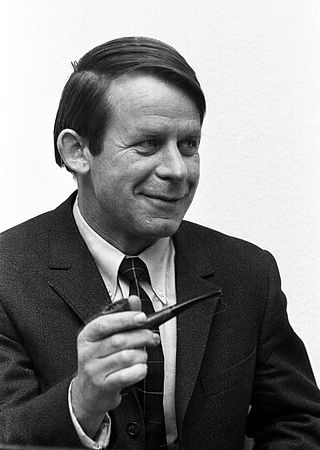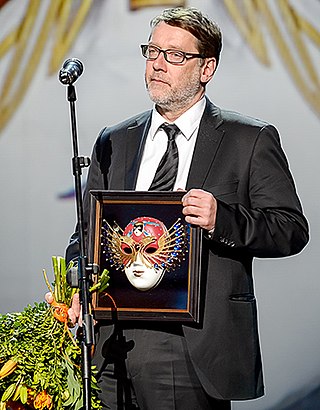
Botho Strauss is a German playwright, novelist, and essayist.
Tankred Dorst was a German playwright and storyteller.

Elfriede Jelinek is an Austrian playwright and novelist. She is one of the most decorated authors to write in German and was awarded the 2004 Nobel Prize in Literature for her "musical flow of voices and counter-voices in novels and plays that, with extraordinary linguistic zeal, reveal the absurdity of society's clichés and their subjugating power". She is considered to be among the most important living playwrights of the German language.

Siegfried Lenz was a German writer of novels, short stories and essays, as well as dramas for radio and the theatre. In 2000 he received the Goethe Prize on the 250th Anniversary of Johann Wolfgang von Goethe's birth. He won the 2010 International Nonino Prize in Italy.
Peter Zadek was a German director of theatre, opera and film, a translator and a screenwriter. He is regarded as one of the greatest directors in German-speaking theater.
Ramin Gray is a theatre director of Iranian (Muslim) and British (Jewish) heritage.
Dieter Dorn is a German theatre director, also for the opera, the manager of the Münchner Kammerspiele from 1983 to 2001 and now manager of the Bavarian Staatsschauspiel.

Klaus Händl is an Austrian actor, writer and director.
René Pollesch was a German author and dramatist.
Mülheimer Dramatikerpreis, founded in 1976, is one of the leading theater awards in Germany. It is awarded by an open jury of theater professionals, critics and playwrights who watch a short list of productions during the Stücke festival; the productions are not the full play but a piece, often the first act. The short list is chosen by a jury from plays that were first performed in Germany during the prior season. The winner receives €15,000.

Jens Harzer is a German stage, film, and television actor. He began his career at the Munich Kammerspiele, and has been a member of the Thalia Theatre in Hamburg since 2009. He has appeared at the Salzburg Festival regularly since 2000. Harzer received prizes for roles on stage, in film and on television. He has been the bearer of the Iffland-Ring since March 2019.

Kathrin Röggla is an Austrian writer, essayist and playwright. She was born in Salzburg and lives in Berlin since 1992 but moved to Cologne in 2020. She has written numerous prose works, including essays, as well as dramas and radio plays. For her literary works, she has won a wide range of awards.

Dea Loher is a German playwright and author.

Das Gesicht im Spiegel is an opera in 16 scenes by Jörg Widmann, with a libretto in German by Roland Schimmelpfennig. The opera is about the emotional consequences and ethical issues of human cloning. The opera was premiered at the Cuvilliés Theatre in Munich on 17 July 2003, conducted by Peter Rundel.

Joachim Philipp Maria Meyerhoff is a German actor, director, and writer.

Sasha Marianna Salzmann is a German playwright, essayist, theatre curator and novelist. They are a writer in residence at the Maxim Gorki Theatre in Berlin where they were artistic director of the studio theatre, Studio Я, from 2013 to 2015.

Karen Köhler is a German writer, playwright and actor.

Michael Thalheimer is a German theatre director.
Since 1993, the Else Lasker-Schüler Dramatist Prize has been awarded by the Pfalztheater Kaiserslautern on behalf of the Rhineland-Palatinate Foundation for Culture. The prize is named after expressionist poet Else Lasker-Schüler (1869–1945). It is endowed with €10,000, one of the most highly endowed playwright prizes in Germany. The award ceremony at the opening of the Theatertage Rheinland-Pfalz in the Pfalztheater or Staatstheater Mainz is carried out by the Prime Minister of Rhineland-Palatinate. Additionally the Stückepreis is awarded for promoting young talents.
Kristo Šagor is a German playwright and director. He has received numerous awards, and his plays Dreier ohne Simone, FSK 16 and Trüffelschweine are now among the most frequently performed plays in German-speaking countries.












